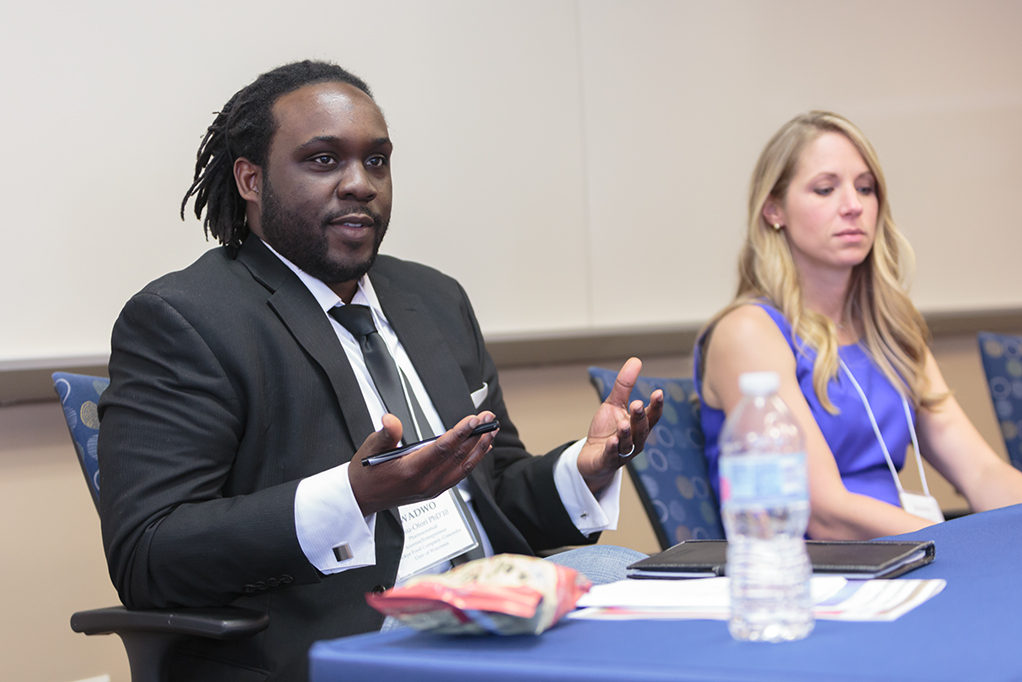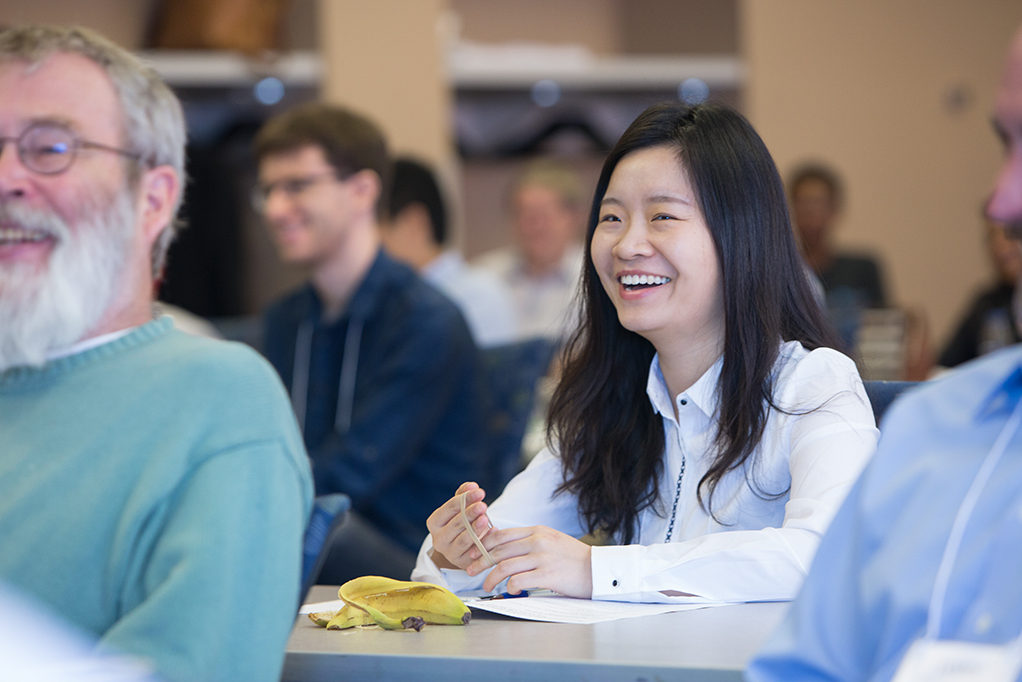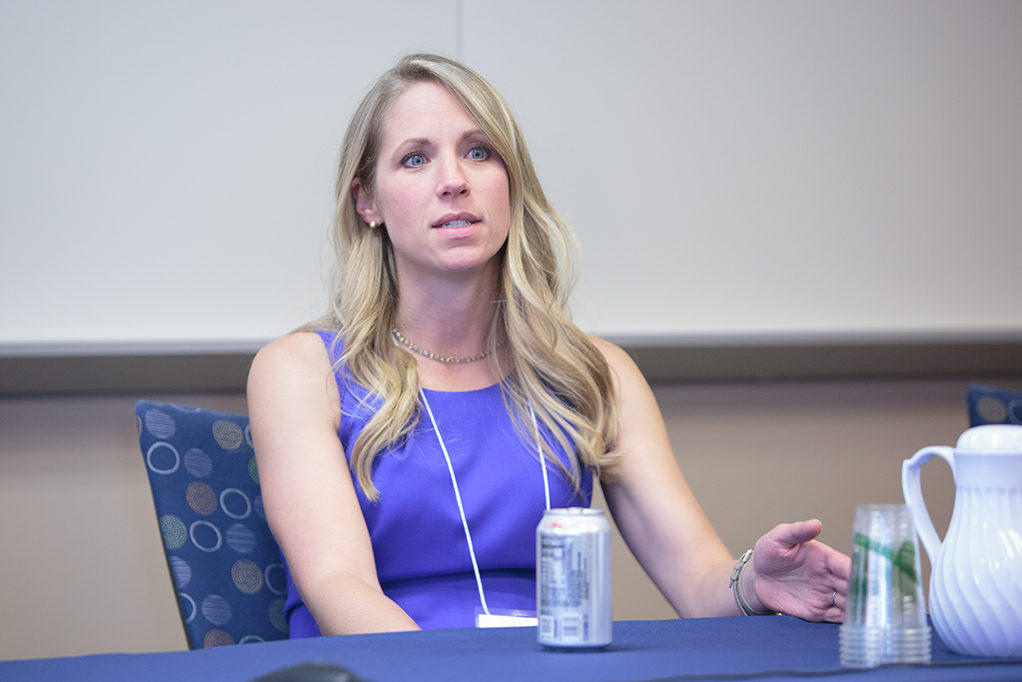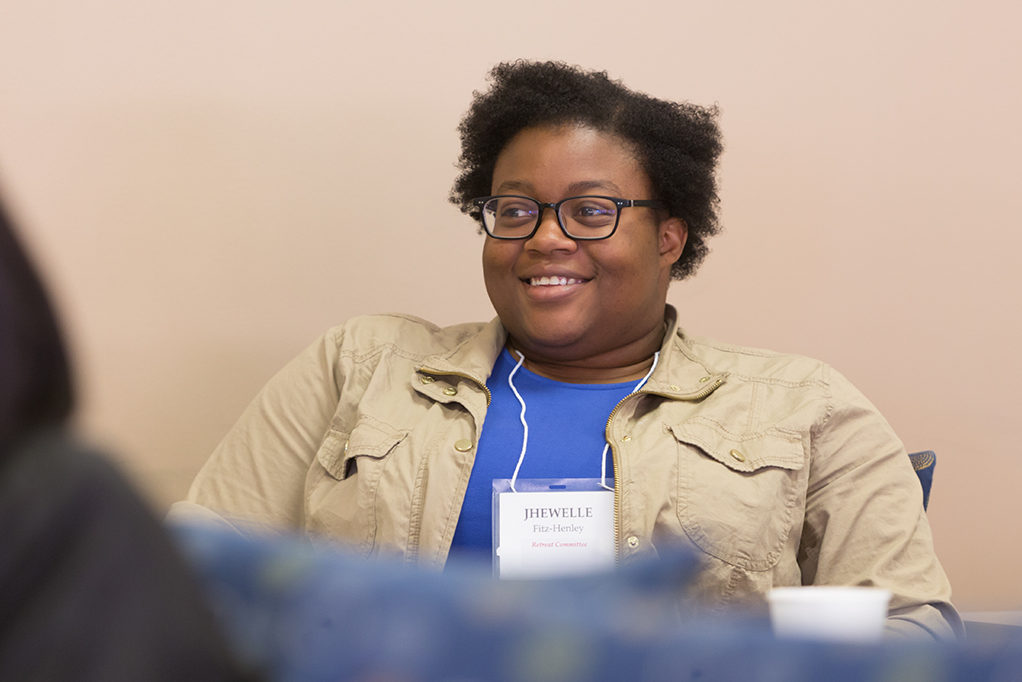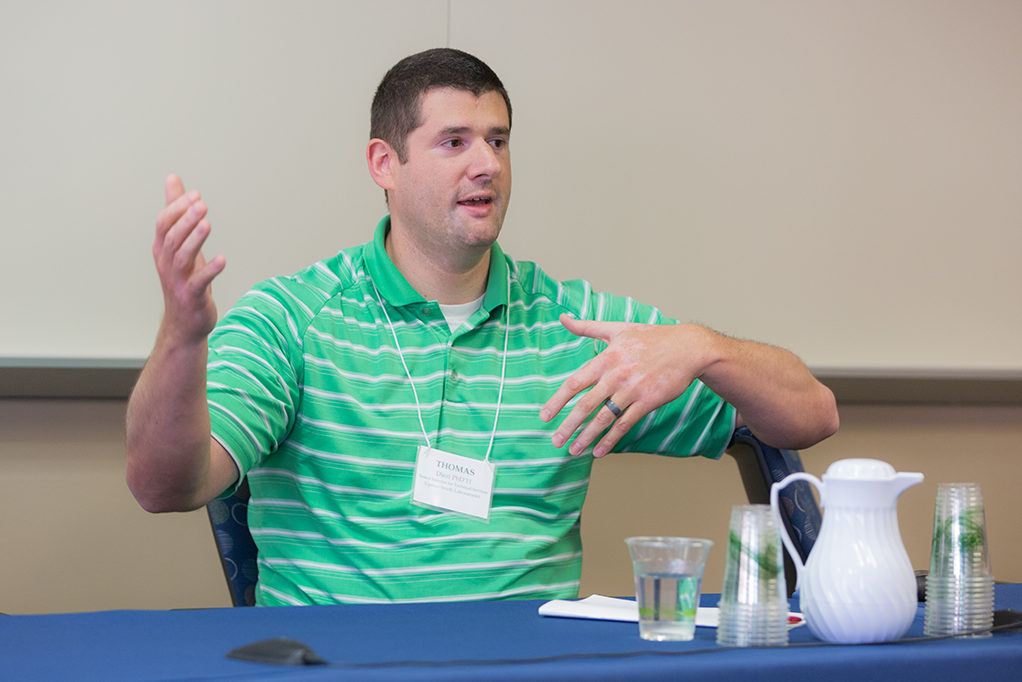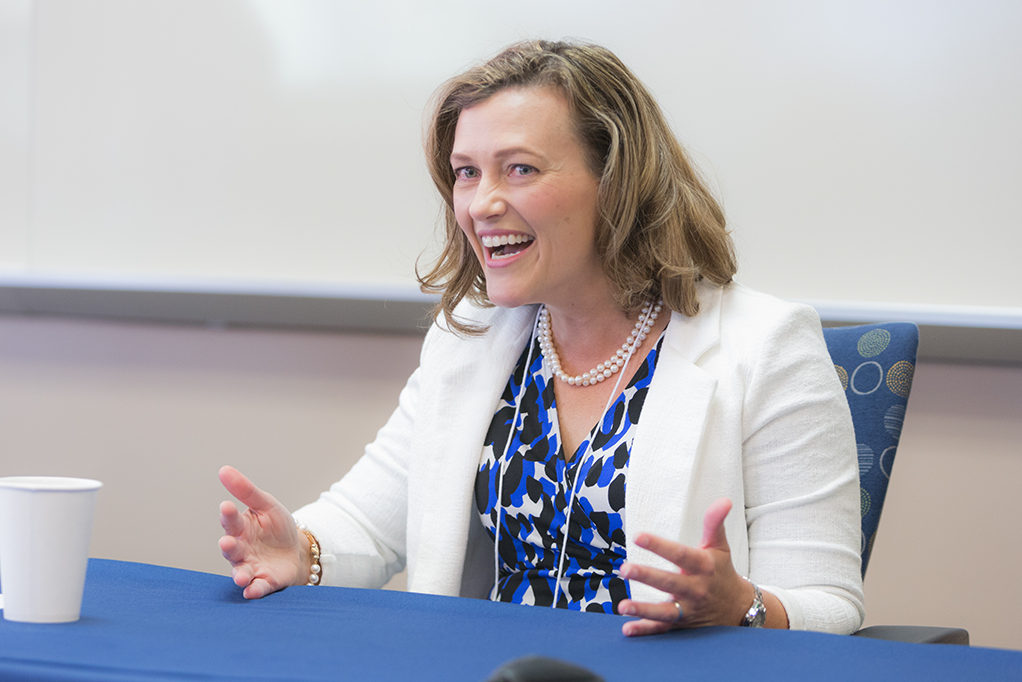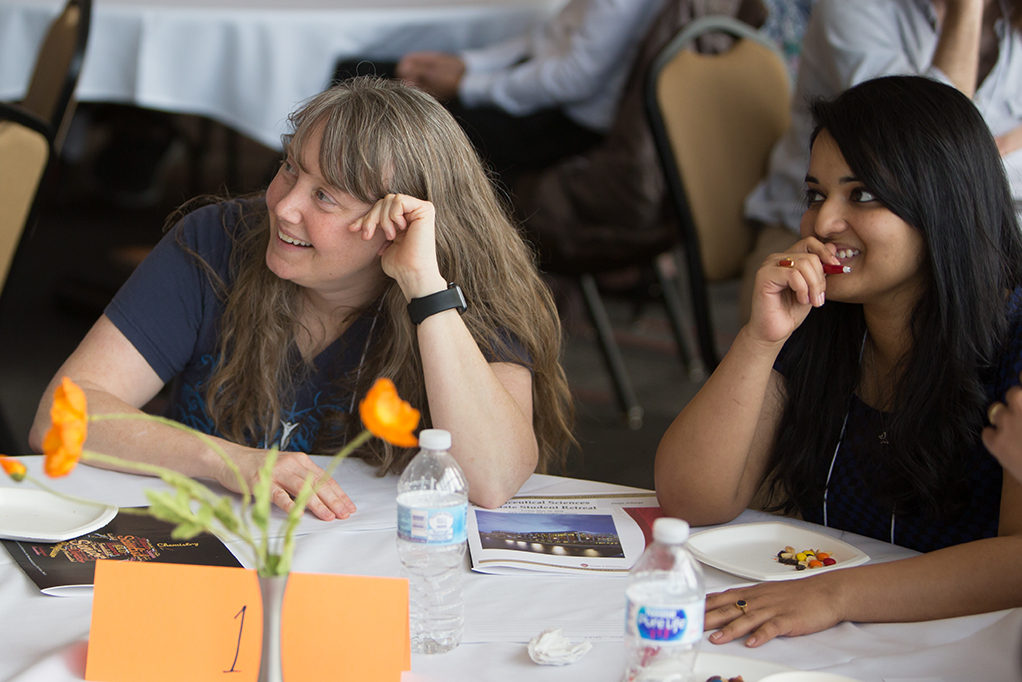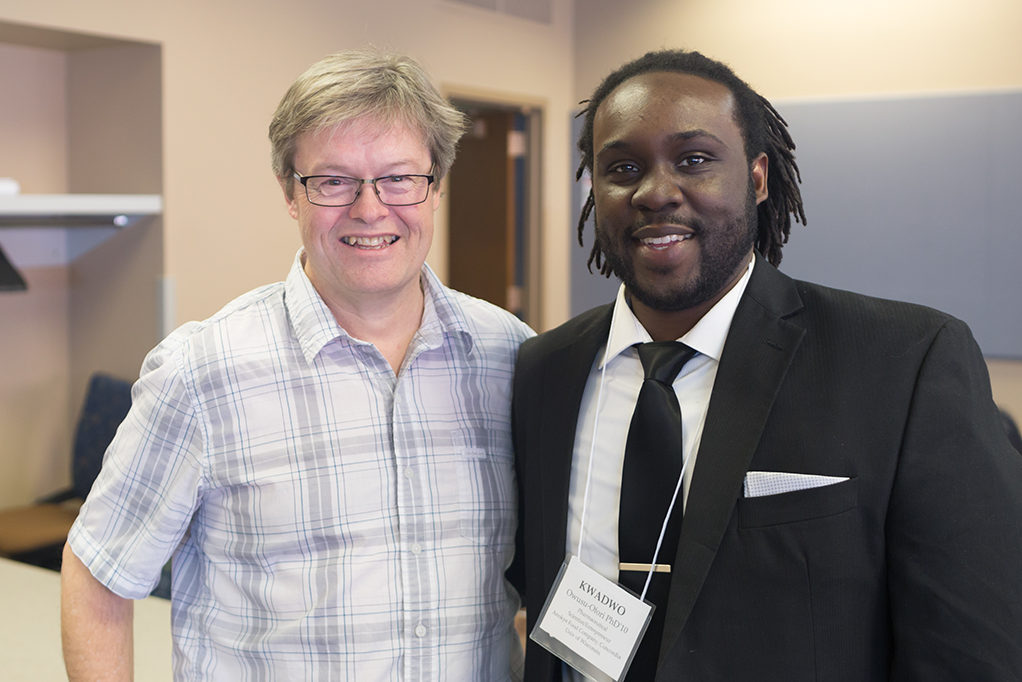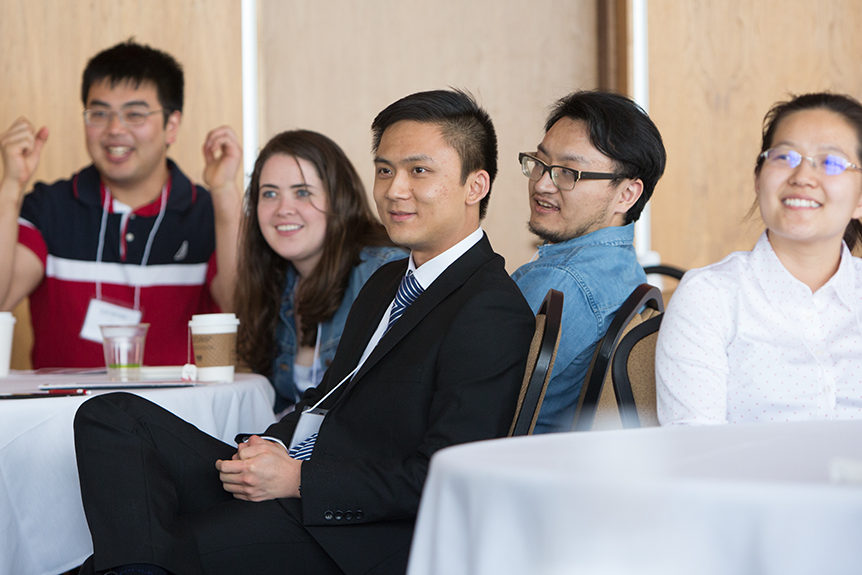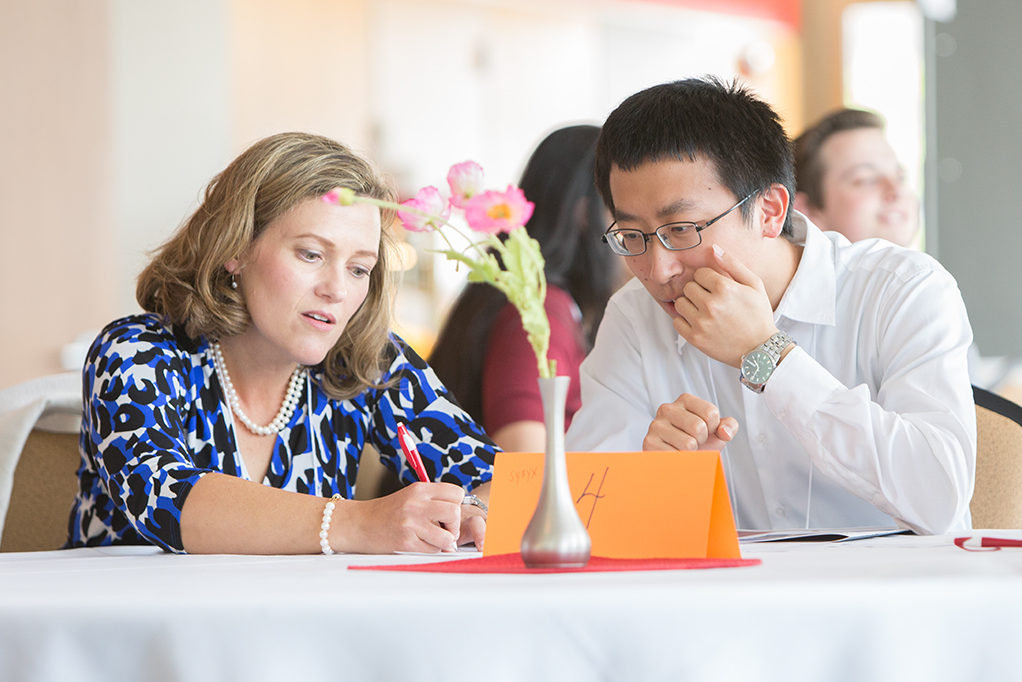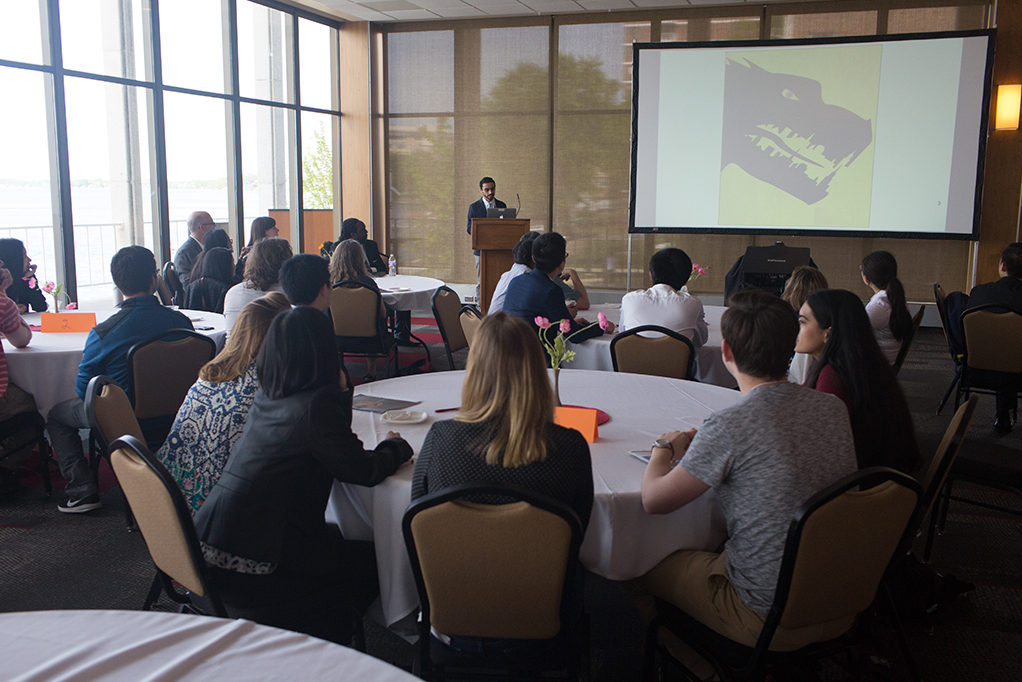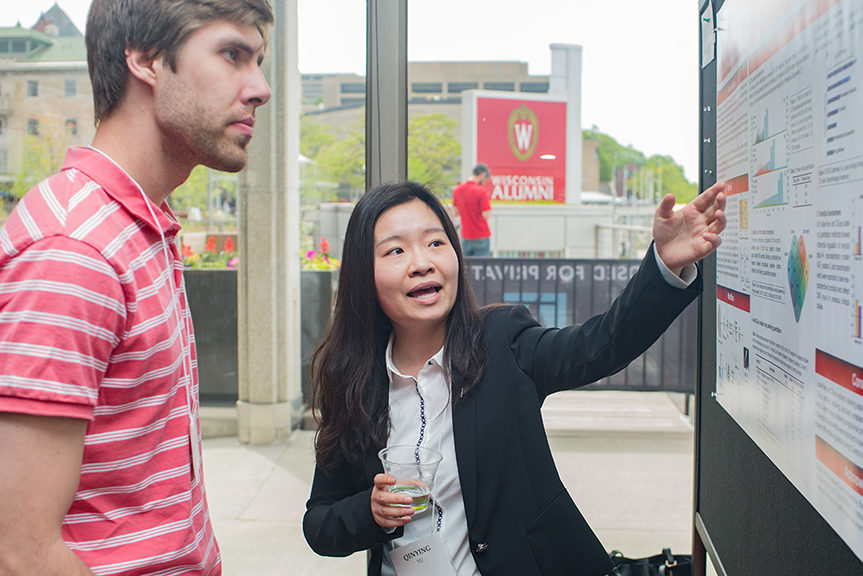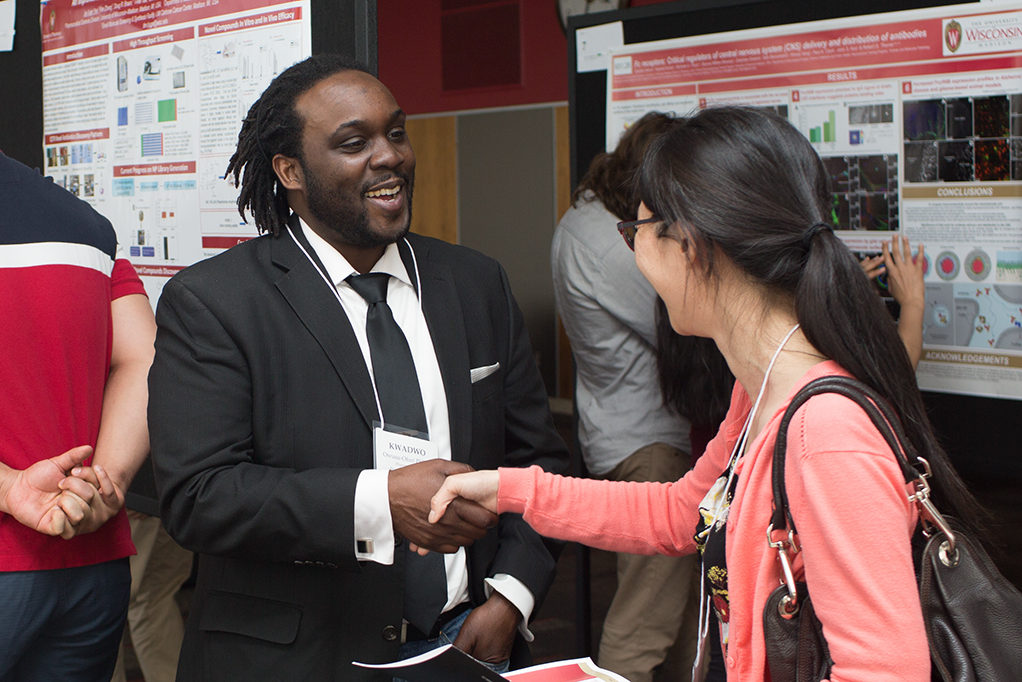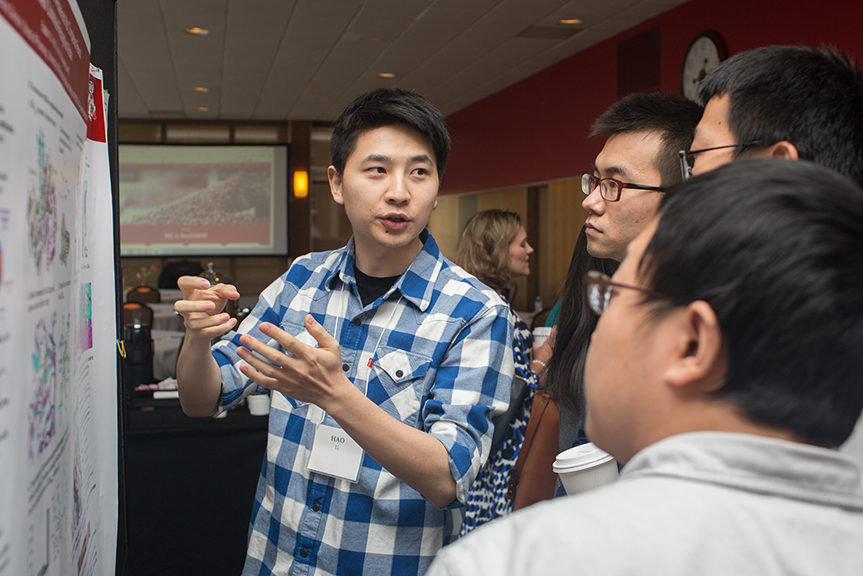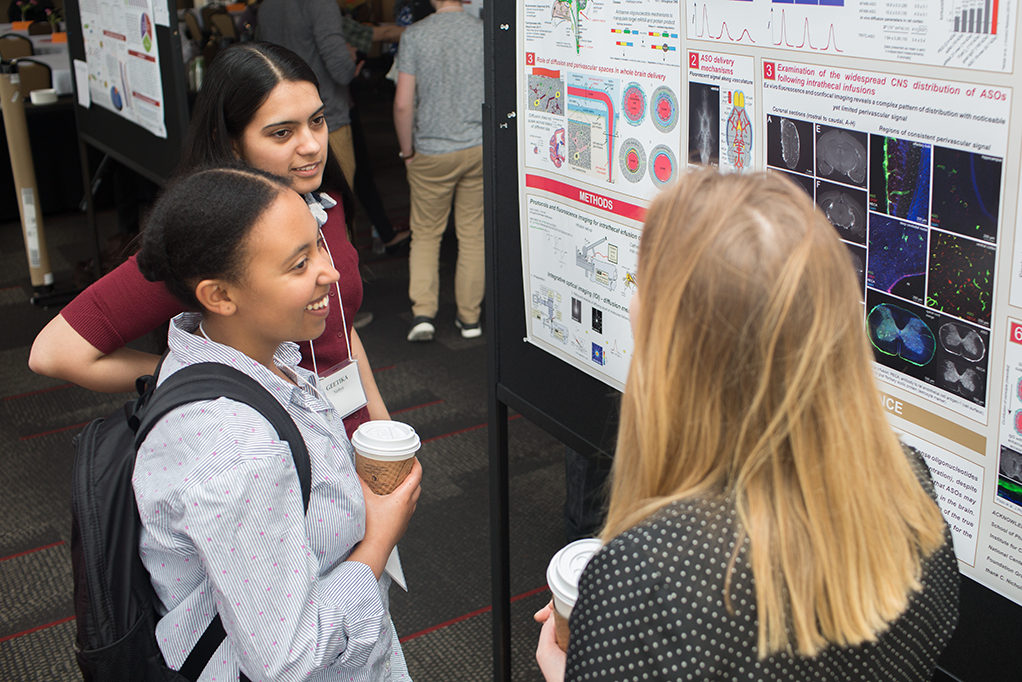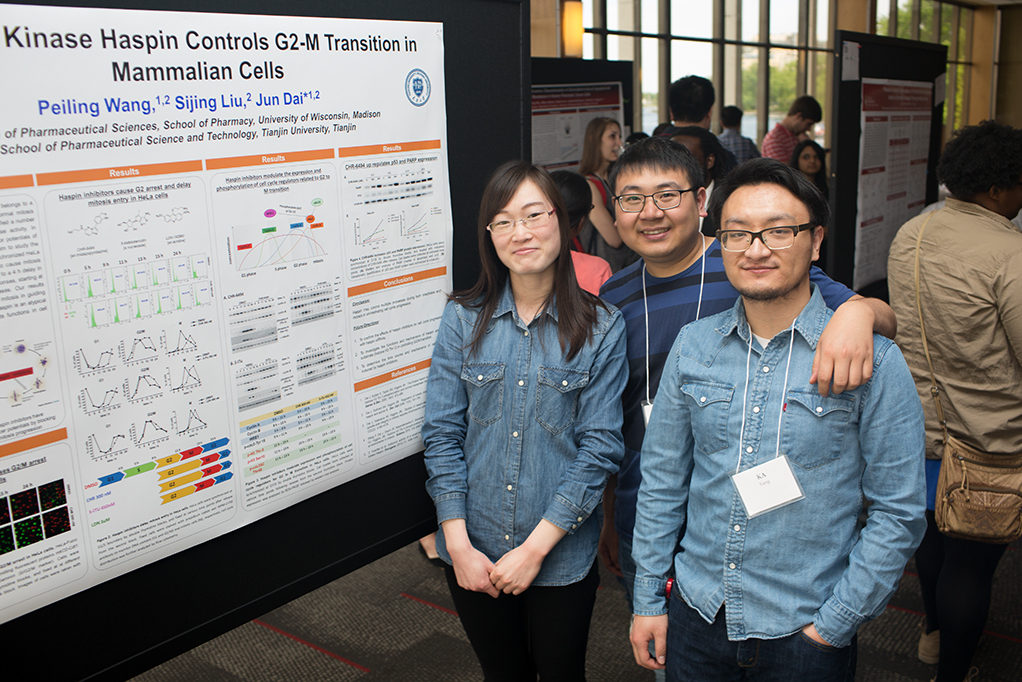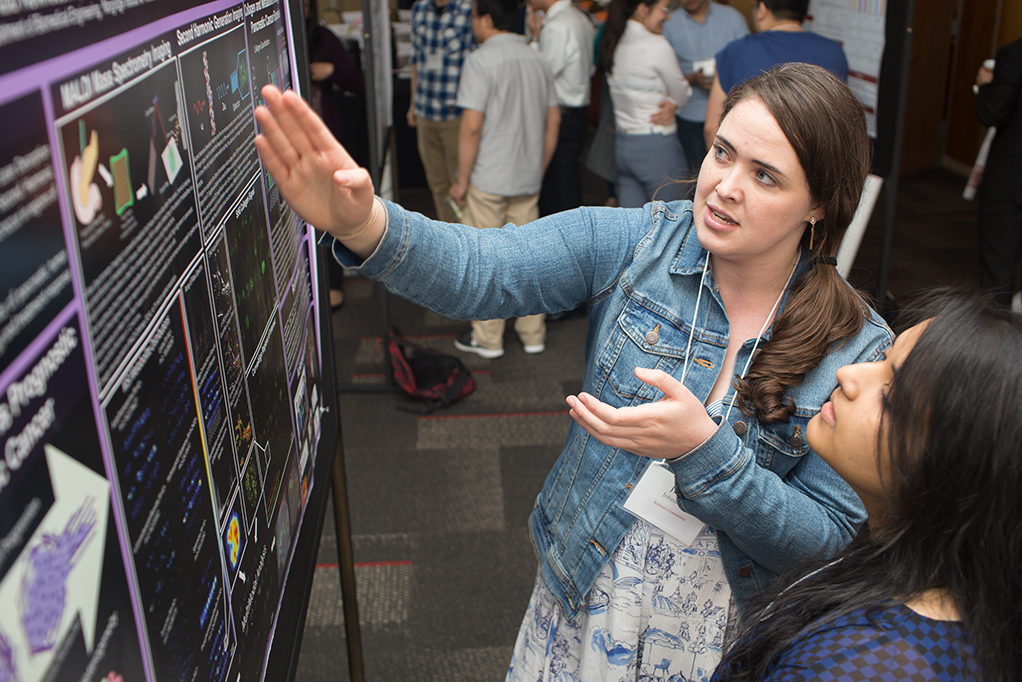School brings alumni, PhD students together to network and learn about career opportunities
By Katie Gerhards
Director of strategic competitive intelligence, senior marketing manager, department head for education and training in the U.S. Navy Environmental Preventative Medical Unit, licensing operations manager—what do these diverse jobs all have in common? The individuals holding them have a graduate degree from the University of Wisconsin–Madison School of Pharmacy’s Pharmaceutical Sciences program.
The rigorous, highly interdisciplinary Pharmaceutical Sciences PhD program is broken into three core areas of study—Drug Discovery, Drug Action, and Drug Delivery—that each provide a solid background in pharmaceutically relevant components of biology, chemistry, and engineering that serves as a launch pad to an array of careers.
In Drug Discovery, student researchers isolate and characterize natural projects, develop small molecules, and other activities that support rational drug design and medicinal chemistry. Drug Action focuses on how drugs impact biological systems and the mechanisms of disease at the cellular, genetic, molecular, and biochemical levels. Drug Delivery explores how to get drugs where they need to be in the body, using physical chemistry and drug transport principles to innovate in formulation, drug targeting, and multi-modal therapy.
“The UW–Madison School of Pharmacy does a great job in teaching students how to become critical thinkers inside and outside of the laboratory environment,” says Kwadwo Owusu-Ofori (PhD ‘10), founder and lead product developer at Anokye Food Company. “The graduate students work on very high-level projects, present at high-level conferences, and publish in high-level journals.”
“There’s a real hunger for students to connect with people who have recently walked through what they’re experiencing now.” –Ken Niemeyer
Owusu-Ofori was one of nine of the School’s PharmSci alumni who recently returned to the UW–Madison campus for a career exploration event to give students insights on various career fields. The 2018 Pharmaceutical Sciences Graduate Student Retreat invited local alumni to share their professional experiences with the School’s nearly 60 current Pharmaceutical Sciences graduate students.
Building connections
“There’s a real hunger for students to connect with people who have recently walked through what they’re experiencing now, so we’re very appreciative of the alumni who are able to come back and share their wisdom with our graduate students,” says Ken Niemeyer, graduate programs coordinator.
To help students see what’s possible, Niemeyer tries to coordinate a presentation or roundtable whenever alumni visit the School, and he’s compiled a list of the job titles held by those who have graduated from the Pharmaceutical Sciences PhD program since 2000.
The retreat, which Niemeyer hopes will be a biannual feature of the program, is intended to give doctoral students even more exposure to alumni and the career paths they’ve blazed for themselves. As the event was geared toward helping students learn about their career options, a group of the graduate students planned the event, with support from Niemeyer and Chuck Lauhon, assistant dean for graduate studies and vice chair of the Pharmaceutical Sciences Division.
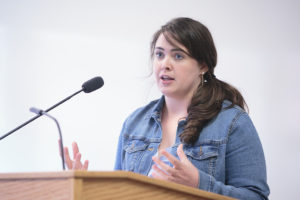
PhD students Shaurya Chanana, Jhewhelle Fitz-Henley, Jill Johnson, Fengfei Ma, Tony Tam, Brynna Wilken-Resman, and Pawel Zbyszynski and came together to design an event that they thought would be the most beneficial to their peers, which resulted in student-moderated panel discussions with alumni in academic, industry, and nontraditional careers; a poster session for students to share their research with each other and alumni; and some social time for mingling and networking.
“It’s important to understand the breadth of careers that a PhD can give you access to, and it’s difficult to do that without being able to talk to people who work in various professions,” says Fitz-Henley. “Being able to connect with alumni afterward made the panel discussions even more valuable.”
Exploring alumni careers
So what does a director of strategic competitive intelligence do? It doesn’t entail black suits, sunglasses, or wristwatches that double as walkie-talkies.
“We don’t use clandestine activities to keep tabs on what our competitors are doing,” says Stacy Keding (PhD ’01) of her job at Eli Lilly and Company. “We use only publicly available information to create a narrative that provides value to the company.”
For example, if a competitor’s pipeline includes a Phase 1 oncology drug, Keding’s team can look at ClinicalTrials.gov to learn more about trials that occurred around the time the company updated its pipeline with the new drug. By studying the clinical trial information, investigators can glean clues to the basis of the drug, such as inclusion or exclusion criteria for patients participating in the trial. If patients cannot have CD20 antibodies, for example, that’s a big clue that the drug is likely a CD20 monoclonal antibody.
In addition to shedding light on the job behind her intriguing title, Keding also wanted to attend the retreat to give student another lens for viewing their careers.
“You reach a point in your career when you start to think about giving back and, as a woman in a field that’s mostly dominated by men, it’s important to be represented at events like this and show students that women can be successful in the pharmaceutical industry as well,” says Keding.
Owusu-Ofori, who founded a pharmaceutical foods company that creates products like an anti-anxiety coffee creamer, is one of the alumni who falls firmly into the “nontraditional” category. After earning his PhD, he went on to become a Kauffman Global Scholar—the only PharmSci PhD Niemeyer has seen in 20-plus years to pursue the one-year leadership program for entrepreneurs.
“Dr. Owusu-Ofori’s story of starting his company by merging pharmaceutical and food industries was incredibly inspiring,” says Johnson, who moderated the discussion. “Part of the beauty of building a career is that the trajectory will likely never be a straight line. The idea behind the nontraditional career panel is to get students to think ‘outside of the box’ on what careers and opportunities are possible with a PhD.”
For Fitz-Henley, the academic panel struck the most profound cord. “I’m passionate about teaching and learning, and this retreat really reinforced my aspiration to become a professor,” says Fitz-Henley. “Meeting the alumni on the academic careers panel was quite meaningful and has me looking forward to the future.”
Launching a pharmaceutical career
Many of the graduate students commented that they were grateful for the opportunity to connect with alumni of the School. Jeanine Burmania (MS ’02), senior licensing manager/licensing operations manager with the Wisconsin Alumni Research Foundation, encourages students to use those UW–Madison connections—even the ones they haven’t made yet.
“You can find UW–Madison graduates at almost any company you’d ever be interested in,” says Burmania. “Reach out to a fellow alumnus and see if they have any feedback for you.”
“I see career planning and candid conversations with program graduates as a key component to a comprehensive education in the biomedical sciences.” –Kwadwo Owusu-Ofori
Those conversations can turn into mentorship, which is linked to increased career satisfaction and productivity in research careers.
“I see career planning and candid conversations with program graduates as a key component to a comprehensive education in the biomedical sciences,” says Owusu-Ofori. “I know firsthand how influential those conversations are, so I was happy to be selected to share my experiences with the current graduate students.”
In many ways, pursuing a career in pharmaceutical sciences mirrors the science itself—driven by curiosity and passion into unknown or unfamiliar territory.
“In addition to advancing your critical thinking and problem solving abilities, obtaining an advanced degree helps you hone your curiosity,” says Keding. “The nature of research is identifying a problem that needs a solution, but there’s no right answer. Instead, there are a multitude of possible answers, and you need to seek one out that fits the criteria. It’s important to remember you aren’t doing this on an island. You have all of the connections you’re making here today and those you’ve made throughout graduate school. There’s no limit to where or how you can add value.”
Read about another successful Pharmaceutical Sciences PhD alum, Azita Saleki-Gerhardt, and her career path in the pharmaceutical industry.
Learn more about the School’s Pharmaceutical Sciences PhD program, or download a brochure.
